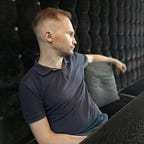How to read 200+ books a year
For last 4 years I was reading from 189 to 407 books a year. How? Straight to the point — with audiobooks.
Why I did this?
I love always seeking new things, yeah, I’m easily bored, so why not? Books are great source of new discoveries, and, to my experience, significantly better than video.
What I discovered?
Out from 1000 books, only 1.5% gotten into my top of the top list. Gems are rare, and sometimes pretty hard to discover. See my top below.
With many books you can arrange some sort of distribution, several highly liked, a bit more very good, several from “B.S.” realm and majority are mainly repeating same original sources (if talking about non-fiction).
Why read so much?
Some people are saying that you need to carefully choose what you read, I partially can agree with that, but problem is that often popular and highly rated stuff, what people would choose to read in the first place, is not useful at all, and real gems are usually hidden out from popular point of view.
Why popular, highly rated books aren’t good enough? It’s a problem which exists with Google Pagerank algorithm too — people only rate what they see in the first page, and over time, this pro-cyclical behavior creates bubbles of ideologies, with very limited information that often has little resemblance with The Real, as I call it.
Also, you cannot rely on reviews of others, because others are not you, so the only way to know what fits you or what are you lacking is to just read first and only then decide where to go from that.
To be honest, I believe that my constant seeking of how to disprove my own beliefs helps me to always find something new and out of usual reality. For example, someone expresses anti-Keynesian economics views, I always think, oh, let’s try to find out more. And The Real doesn’t disappoint, because then you know that Keynes never said the things that people in The Pop generalize to be true. Pick any Pop belief, and probably I had read about it and can discuss about it in more of The Real terms.
Is it hard?
The year with 407 books was plain crazy. I not only listened to books all the waking time, but also managed to read paper technical books at the same time. As any one of books has only a few pieces of new or insightful information (I read mostly non-fiction only and I learned to not hear average, illogical or biased information), it’s pretty manageable to listen and do the usual work (coding for me, any other activities are even easier) or speed-read some unrelated technical stuff.
On the other hand, wouldn’t want to try that again, because tempo with so many activities is plain insane.
Also, work, which requires higher concentration, like trying to grasp totally new concepts or understand the problem in the main activity, you need to put earphones aside.
Top 1%
- Understanding Power: The Indispensable Chomsky, by Noam Chomsky
- The Better Angels of Our Nature: Why Violence Has Declined, by Steven Pinker
- The Lucifer Effect: Understanding How Good People Turn Evil, by Philip G. Zimbardo
- Probability and Finance: It’s Only a Game!, by Glenn Shafer
- Obedience to Authority, by Stanley Milgram
- Simulacra and Simulation, by Jean Baudrillard
- The Willpower Instinct: How Self-Control Works, Why It Matters, and What You Can Do to Get More of It, by Kelly McGonigal
- The Selfish Gene, by Richard Dawkins
- Antifragile: Things That Gain from Disorder, by Nassim Nicholas Taleb
- Pitch Anything: An Innovative Method for Presenting, Persuading, and Winning the Deal, by Oren Klaff
- Capital in the Twenty-First Century, by Thomas Piketty
- Thinking, Fast and Slow, by Daniel Kahneman
- Sex at Dawn: The Prehistoric Origins of Modern Sexuality, by Christopher Ryan
- The Black Swan: The Impact of the Highly Improbable, by Nassim Nicholas Taleb
- Fooled by Randomness: The Hidden Role of Chance in Life and in the Markets, by Nassim Nicholas Taleb
- Blink: The Power of Thinking Without Thinking, by Malcolm Gladwell
Outliers: The Story of Success, by Malcolm Gladwell - Quantum Psychology: How Brain Software Programs You & Your World, Robert Anton Wilson
- Science and Sanity: An Introduction to Non-Aristotelian Systems and General Semantics, by Alfred Korzybski
How to become that top 1%?
Book should be sort of profound work on The Real, either explaining true human nature, or some area of the life in a non-trivial way.
